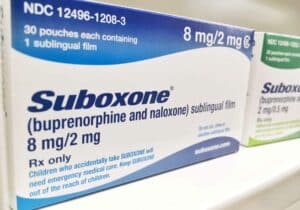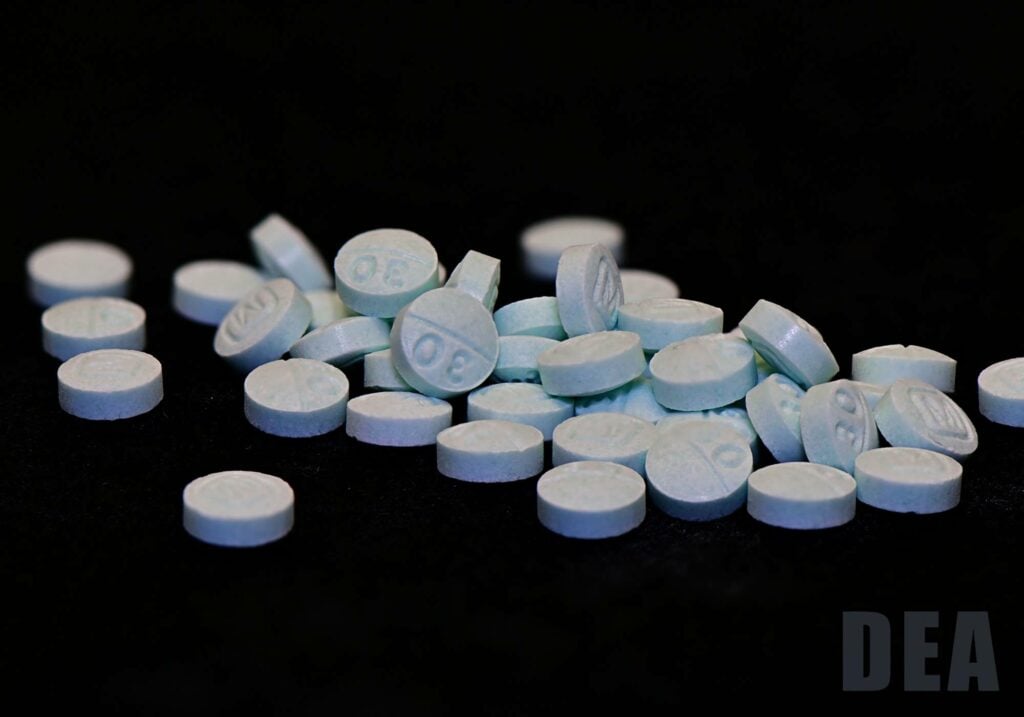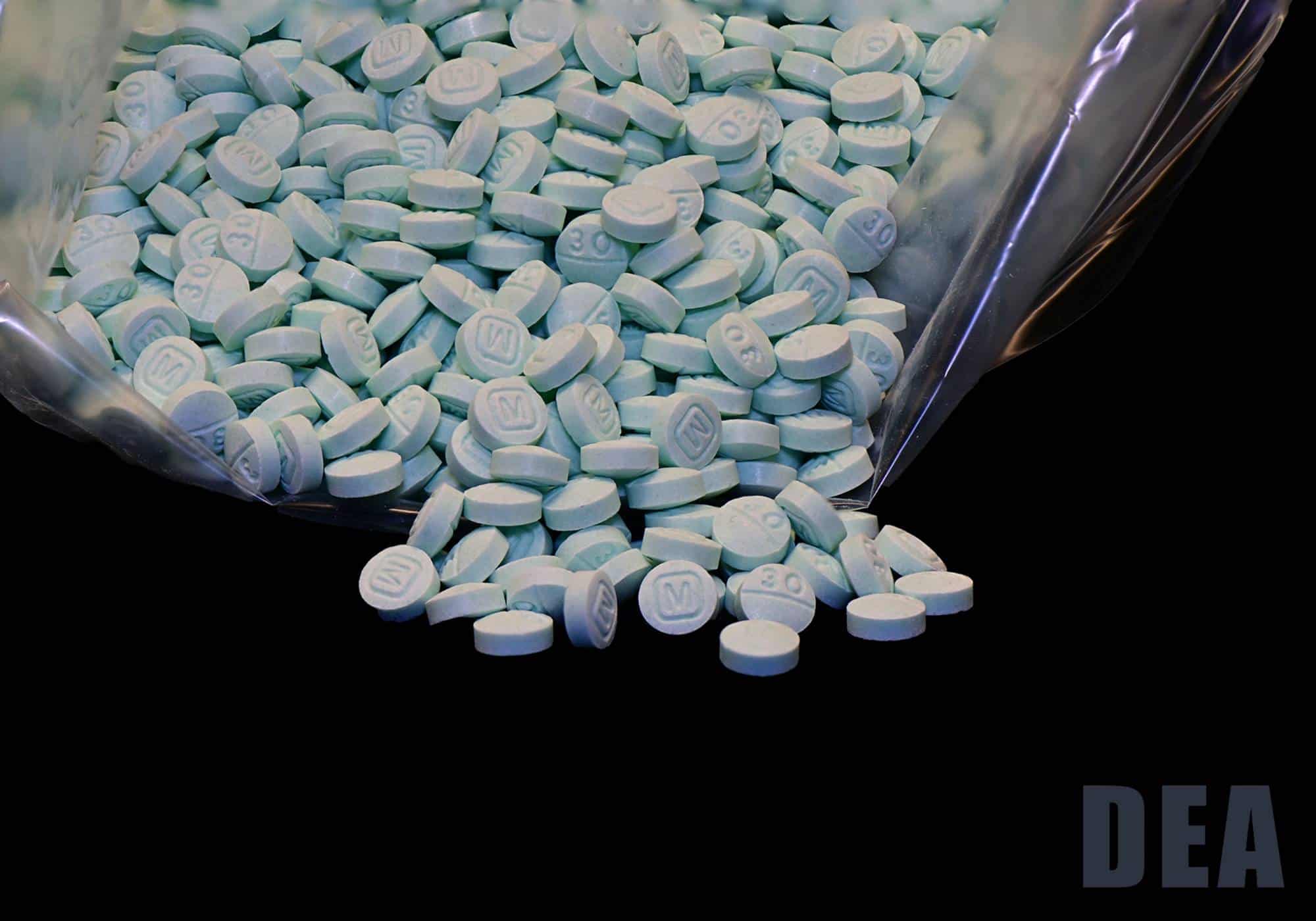The term “blues drugs” typically refers to blue pills such as the M30, commonly known as “oxy,” which symbolize the opioid crisis in the United States and beyond. The misuse of these pills has led to widespread addiction, overdoses, and numerous lives impacted.
Common street names for these pills include:
- M-30s
- Blue pills drug
- Dirty 30s
- Mexies
Often, these illicit substances are designed to look like legitimate prescription drugs, marked with identifiers like “M30,” and may leave a powdery residue due to their texture.
However, it’s crucial to recognize that not all blue pills are associated with abuse. Many legitimate medications, like certain doses of oxycodone and fentanyl, are also blue and are prescribed by medical professionals to manage severe pain, significantly enhancing the quality of life for individuals with chronic pain conditions.
What is The M30 Pill (Blues Drugs)?
The term “blues drugs” describes a group of counterfeit oxycodone pills known by several names, including M30 pills, dirty 30s, m-boxes, and Mexican blues. These pills are marked with “M30,” mimicking legitimate 30 milligram oxycodone tablets.
The risk associated with these counterfeit pills stems from the uncertainty of their contents. Although they look similar to prescription oxycodone, the actual composition of these pills can be drastically different. The U.S. Drug Enforcement Agency (DEA) has found that approximately 70% of counterfeit prescription drugs seized recently contain fentanyl, a highly potent synthetic opioid. This makes the use of blues drugs particularly dangerous due to their unpredictable and potentially lethal effects.
How Are Blues Drugs Used?
“Blues” is a common slang term for blue-colored opioid pills, such as oxycodone, and their usage varies, often involving methods that are illegal and dangerous without a prescription. Here’s how they are typically consumed:
- Oral Ingestion: The safest and medically intended method where the user swallows the pill, allowing it to be processed through the digestive system before entering the bloodstream.
- Crushing and Snorting: Some users crush the pills into a fine powder to snort, which expedites the drug’s entry into the bloodstream via nasal tissues, producing a quicker, more intense high.
- Smoking: Others opt to smoke the crushed substance, which, like snorting, allows for rapid absorption into the bloodstream through the lungs.
- Injection: Perhaps the most perilous method involves dissolving crushed pills in water and injecting the solution intravenously. This method delivers a swift and potent high but significantly raises the risk of overdose and infectious diseases, such as HIV and hepatitis, through shared needles.
It is essential to recognize that any recreational or non-prescribed use of opioids like the “blues” not only contravenes the law but poses severe health risks. These misuse techniques disrupt the drug’s designed release mechanism, heightening the likelihood of overdose, dependency, and chronic health complications. Opioid usage should be strictly managed by medical professionals. If you suspect misuse or addiction, immediate action is recommended. For guidance and support, contact us today at 423-441-4650.
What is the Origin of Blues Drugs?
Blues drugs, recognizable by the M30 imprint, mimic 30mg oxycodone tablets and are notable for their distinct blue color. The “M” and “30” markings make these tablets highly susceptible to counterfeit reproduction in the illicit drug market. Many of these fake versions contain fentanyl, significantly increasing their potential for harm.
These counterfeit pills are largely produced in countries such as China and Mexico before entering the U.S. market. Without any regulatory oversight or quality control, these illicit products often contain lethal doses of fentanyl and other dangerous substances, posing serious risks to users. The spread of these counterfeit pills is largely facilitated by online marketplaces and social media platforms, which serve as major distribution channels.
Alarmingly, there is an increasing trend among high school and college students obtaining drugs like Adderall and Xanax—often laced with fentanyl or methamphetamine—from the dark web or through social media contacts. This situation presents a critical health threat to young individuals, highlighting the need for heightened awareness and preventive actions to protect our youth from the dangers of adulterated pharmaceuticals.
Can You Get Addicted to Blues Drugs?
Yes, addiction to “blues” drugs—opioids such as oxycodone—is highly probable due to their profound impact on the brain’s reward system.
Here’s a breakdown of how addiction typically develops:
- Tolerance: Regular use of opioids can lead to tolerance, requiring increasingly higher doses to achieve the same euphoric effect, often prompting escalated use.
- Dependence: Prolonged consumption can cause your body to depend on these drugs for normal functioning, leading to withdrawal symptoms if usage ceases, which is a hallmark of physical dependence.
- Addiction: This chronic disorder involves compulsive drug-seeking behavior and continued use despite negative consequences. It results in long-term brain changes and is recognized as both a mental and brain disorder.
The risk of developing an addiction increases when opioids are misused—taken in higher doses, more frequently, or in unauthorized ways such as snorting or injecting, even if they were originally prescribed by a doctor.
Blue Fentanyl Pills on the Street
Blue counterfeit pills that mimic prescription-grade Oxycodone are commonly found on the streets, often laced with fentanyl or completely made of it. These pills typically appear light blue and round but may also come in rainbow-colored fentanyl variants, which have recently been documented. Blue pills are the most commonly seen variety.
These pills are known by street names such as “M-30s,” “blues,” “dirty 30s,” and “Mexies.” While they often bear numerical imprints similar to legitimate medications, their texture may be grainier, leaving a powdery residue when handled.
Individuals new to using strong opioids are particularly vulnerable to overdosing on these pills due to the high potency of fentanyl. An overdose can drastically reduce a person’s breathing rate, often requiring multiple doses of Narcan, an emergency medication used to counteract the effects of opioids.
Dangers of Blues Drug
The rise of counterfeit opioids like blue fentanyl pills has deeply intensified the opioid crisis, bringing about substantial risks:
- Fatal Dosage Risks: The unpredictability of fentanyl content in these pills makes even tiny amounts potentially lethal, where as few as three grains can result in death.
- Increased Overdose Risk: Due to unregulated production, these pills often contain dangerously high levels of synthetic opioids, significantly increasing the risk of life-threatening respiratory depression and overdose deaths.
- Misleading Appearances: The counterfeit pills closely resemble legitimate opioids, misleading users about their safety and potentially leading to accidental overdoses and fatalities.
- Harmful Health Effects: Regular consumption of these tainted opioids can cause serious health issues, including organ damage, respiratory distress, and persistent addiction, which further degrades health.
The widespread distribution of these dangerous substances underscores the urgent need for vigilant regulatory enforcement and comprehensive strategies to halt the illegal production and distribution of lethal drugs.
Risk of Using Blue Drugs
M30 pills, colloquially known as “blues,” pose substantial health risks due to the unpredictable and potent presence of fentanyl in these counterfeit opioids.
Short-Term Risks of Blues Drug
- Overdose Potential: The high potency of fentanyl significantly increases the risk of overdose, which can lead to respiratory failure, coma, or death.
- Respiratory Depression: Fentanyl’s ability to severely slow breathing can result in hypoxia, a dangerous condition depriving the brain and vital organs of necessary oxygen.
- Cardiovascular Risk: The drug may induce harmful changes in heart rate and blood pressure, potentially triggering critical heart-related problems.
- Psychological Effects: Users may experience severe psychological reactions such as intense anxiety, paranoia, and disorientation, which are especially dangerous in unfamiliar or unsafe environments.
Long-Term Risks of Blues Drug
- Addiction and Dependence: Frequent use of blues can lead to both physical and psychological dependence, making cessation challenging and posing risks of long-term health damage.
- Respiratory Health: Chronic abuse could cause enduring respiratory issues, reducing lung function and increasing infection risks.
- Neurological Impact: Extended abuse of opioids like fentanyl can impair cognitive functions, affect memory, and reduce problem-solving capabilities.
- Mental Health Concerns: Continuous use is associated with an elevated risk of developing mental health disorders such as depression, anxiety, and psychosis.
- Physical Health Degradation: Sustained consumption can severely impact physical health, damaging vital organs like the liver, kidneys, and heart.
How Do Blue Pills Affect Users?
Ingesting counterfeit blue painkillers typically induces an immediate euphoric and analgesic effect due to the potent opioid properties of fentanyl. This sensation is often accompanied by intense sedation and relaxation. However, prolonged use of these counterfeit “blues” can lead to severe health complications, including addiction, increased tolerance, and intense withdrawal symptoms when usage ceases. Over time, habitual use may cause cognitive deterioration, emotional instability, and various mental health challenges, significantly harming vital organs like the liver and heart.
The Lethal Risk of Blue Fentanyl
Blue fentanyl has become a particularly dangerous substance, especially among young people, due to its widespread availability on social media platforms and apps where it is often sold cheaply. Fentanyl is now the leading cause of overdose deaths in the United States, highlighting the stark reality that even a single pill can be deadly. The DEA’s #OnePillCanKill campaign aims to educate parents and families about the dangers of fentanyl-laced drugs, emphasizing the lethal risks posed by substances altered by cartels and dealers who prioritize profit above safety.
For those battling substance use, Narcan is an essential safeguard, capable of reversing the effects of an overdose. Ensuring access to Narcan can be a lifesaving action for individuals at risk.
How Addictive Are M30 Blue Pills?
M30 blue pills, containing the potent opioid oxycodone, are notably addictive and pose a substantial risk of dependency. These pills demand careful monitoring, even when used as directed, to ward off the possibility of addiction. Initiating early intervention and seeking support from addiction treatment programs or counseling are crucial if there’s any suspicion of addiction to M30 pills. Promptly addressing this issue can significantly enhance recovery prospects and diminish the risk of severe side effects associated with this potent medication.
Signs of Blues Drug Abuse
Concerned about someone possibly abusing M30 pills?
Watch for certain telltale changes and behaviors that may include:
- Sudden mood swings
- Behavioral changes
- Frequent drowsiness or sedation
- Constricted, pinpoint pupils
- Noticeably slower breathing rates
- Episodes of nausea
- Unusual itchiness
- Unexplained weight loss
- Neglecting personal hygiene
- Disrupted sleep patterns
- Displaying withdrawal symptoms when the drug is not available
These signs, especially when appearing in combination, can signal opioid abuse and underscore the urgency for immediate medical intervention or care.
Can You Overdose on Blues Drugs?
Overdosing on “blues drugs”, or opioid medications like oxycodone, is both possible and dangerous. Here’s how overdoses can occur:
- Respiratory Depression: The most severe risk of opioid overdose is respiratory depression, where breathing slows or stops, potentially causing brain damage, coma, or death due to oxygen deprivation.
- High Potency: Opioids are potent substances where excessive doses can swiftly lead to overdose, particularly in those with low tolerance.
- Combination with Other Substances: Mixing opioids with depressants like alcohol or benzodiazepines significantly enhances the risk of lethal respiratory depression.
- Variable Tolerance: Users resuming consumption after a break may face heightened overdose risks if they use doses they previously tolerated before ceasing use.
- Unknown Composition: Illegally acquired drugs may contain unknown or more potent substances like fentanyl, which dramatically spike overdose risks.
Signs of a Blues Drugs Overdose:
- Pale, clammy skin
- Limp body posture
- Cyanosis on fingernails and lips
- Unusual snoring or gurgling sounds
- Unresponsiveness or inability to wake up
- Severely slowed or stopped breathing and heartbeat
Immediate action, such as calling 911 and administering naloxone (Narcan)—a life-saving medication that reverses opioid effects—is crucial in suspected overdose cases. Subsequent professional addiction treatment is essential for recovery and can be initiated by contacting us at 423-441-4650 or filling out our online contact form.
The Escalating Issue of Fentanyl and Opioid Addiction
Fentanyl has disturbingly become widespread in the drug market, mainly due to its low-cost production by manufacturers in China and subsequent distribution by cartels as counterfeit pills, often unbeknownst to users.
Blue fentanyl, in particular, has grown in popularity among teenagers, likely driven by a lack of sufficient awareness and education about its dangers. In response, educational institutions and health authorities are intensifying their initiatives to educate and safeguard young people. Opioid addiction can have a profound effect on a young person’s brain, leading to behavioral problems, severe health issues, and a heightened risk of lethal overdose.
If you or someone you know is battling with opioid or fentanyl addiction, remember that help is available. You don’t have to wait for a crisis to reach out. Making a call to Iris Wellness at 423-441-4650 can be your initial step towards recovery. Discover the available recovery options and move towards a healthier, substance-free future.
Blues Drug Addiction Treatment at Iris Wellness Group
Take the first step towards reclaiming your life from Blues Pill addiction in Chattanooga, TN with Iris Wellness Group. We provide a spectrum of outpatient treatment options for those struggling with fentanyl addiction, including detox, Intensive Outpatient Programs (IOP), Partial Hospitalization Programs (PHP), and Adolescent IOP. Our approach is holistic, integrating cognitive behavioral therapy, group counseling sessions, support groups, and relapse prevention education to help clients break free from psychological dependence on Klonopin.
If you or a loved one is battling with m30 pill addiction in Chattanooga, TN, support is available. Contact Iris Wellness Group at 423-441-4650 or fill out our online contact form to discover our blues drugs addiction treatment in Chattanooga, TN designed to guide you through every step of recovery.












